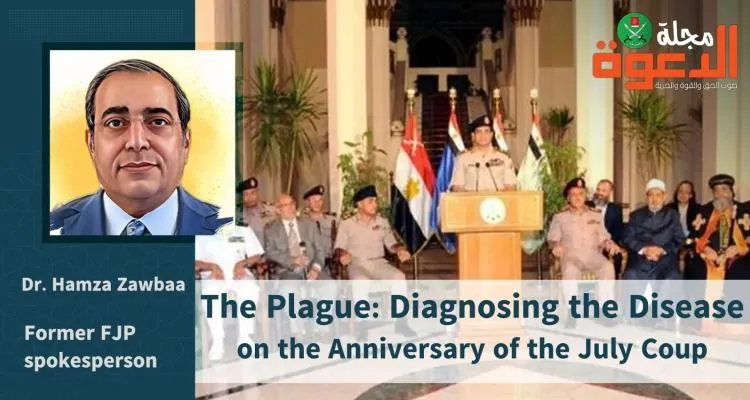

The Plague: Diagnosing the Disease on the Anniversary of the July Coup
The plague is an epidemic that has affected humanity many times throughout its long history. The first occurrence was during the reign of Akhenaten, between 1353 and 1335 BC. In the fourteenth century, the plague appeared in Europe between 1347 and 1352 AD. The third wave of the plague happened in the twentieth century and lasted until 1959, claiming the lives of twelve million people. Fortunately, the epidemic plague has disappeared and is no longer present. The unfortunate news is that another plague still affects some developing countries, especially Egypt, which was afflicted by the military plague in the mid-20th century. This plague remains endemic in beloved Egypt.
Since the 1952 coup—which we commemorate today—Egypt has been controlled by the generals (the term "generals" here refers to soldiers, not military ranks, as some 1952 generals did not hold ranks higher than "captain" or "major" at the time). So, what actions did the generals of 1952 and 2013 take to shape Egypt?
Here are some questions about reality and hope that help us diagnose the truth of the Egyptian situation and observe the effects of what I call the military plague on life in Egypt.
• Has Egypt become an advanced country three-quarters of a century after 1952, or even twelve years after the 2013 coup?
• Has Egypt's internal and external debt decreased?
• Has the value of the Egyptian pound gone up?
• Has Egypt maintained its territory, ports, beaches, and territorial waters?
• Has the income of the Egyptian citizen increased compared to neighboring countries, for example?
• Have commodity prices decreased, and has the level of government-provided services improved?
• Has the number of detainees and forcibly disappeared persons gone up or down?
• Has the number of prisons in Egypt increased, decreased, grown, or multiplied?
• Has the number of deaths and martyrs at the hands of generals decreased or increased in prisons, universities, sit-ins, and on the streets?
• Has the level of corruption and bribery decreased within ministries and government agencies?
• Have drug abuse and the crimes resulting from it decreased?
• Has written and computer illiteracy declined?
• Has Egypt shifted from dictatorship and autocracy to popular rule?
• Have the people enjoyed the freedom of expression and the freedom to choose their representatives and how they are governed?
• Has Egypt's image improved in the eyes of the international community, or at least within the Arab world?
• Has Egypt upheld its historical reputation among peoples and nations?
• Has Egypt regained its position on the African continent?
• Has Egypt continued its role in the Arab-Israeli conflict, or has it shifted to a mediator pressuring the Palestinians?
All answers: No.
The military plague has visible signs, features, and symptoms, along with others that can only be seen through specialized equipment. The most important of these symptoms are the following:
1. A substantial percentage of governors and ministers are soldiers (about 60% of the governors, with the rest being military loyalists).
2. A rise in the percentage of soldiers in state-owned institutions, agencies, and companies nationwide (at least 70%).
3. The emergence of a military "rash" in influential positions, such as the Egyptian Opera House, once overseen by Major General Samir Farag; the Unified Medical Procurement, Supply, and Logistics Authority, established by Major General Dr. Bahaa El-Din Zidan; and the State Information Service, which was set up by Major General Hisham Abdel Khaleq, who was delegated to manage its financial and administrative affairs with journalist Diaa Rashwan. For your information, the authority has 69 foreign offices, and their salaries are paid in US dollars. The military influence has even extended to the Ministry of Endowments, where four major generals now serve as deputy ministers.
4. The presence of paralysis against Ethiopia has deprived Egypt of its historical rights to the Nile waters.
5. The rise in the frequency of voluntary and involuntary flattery over time.
6. The decline of the civilian component of the government in favor of the state-owned sector.
7. The state of weakness, exhaustion, and shortness of breath that the nation and its citizens experience.
8. The state of agitation, spasms, and nervous convulsions that afflict soldiers caused by criticism, even if it is constructive.
9. The gloom and sadness that darken any general's face when speaking to or with the people.
10. Feeling cold and trembling due to the increasing popular rejection of the military's practices.
11. Insensitivity and failure to respond to national emergencies, such as road and train accidents, landslides, and fires.
12. The generals' hallucinations and delirium when their so-called achievements are brought up.
13. The involuntary scream that occurs in military media when mentioning legitimacy, President Morsi, the Muslim Brotherhood, and Islamism in general.
14. Obsessive-compulsive disorder when discussing the January 2011 Revolution.
15. Deliberate normalization amid the siege on our people in Palestine, especially in Gaza.
16. Senior military personnel often suffer from poor eyesight, insight, blurred vision, and strabismus.
17. Failure to respond to all medications and painkillers, as it seems that the solution is unfortunately not the usual medications.
For your information, the worm has spread among religious circles and has also reached some governorates, following the toxic training received by imams of the Ministry of Endowments and Al-Azhar at the Military Reserve Officers College.
May God have mercy on Egypt and its people.


